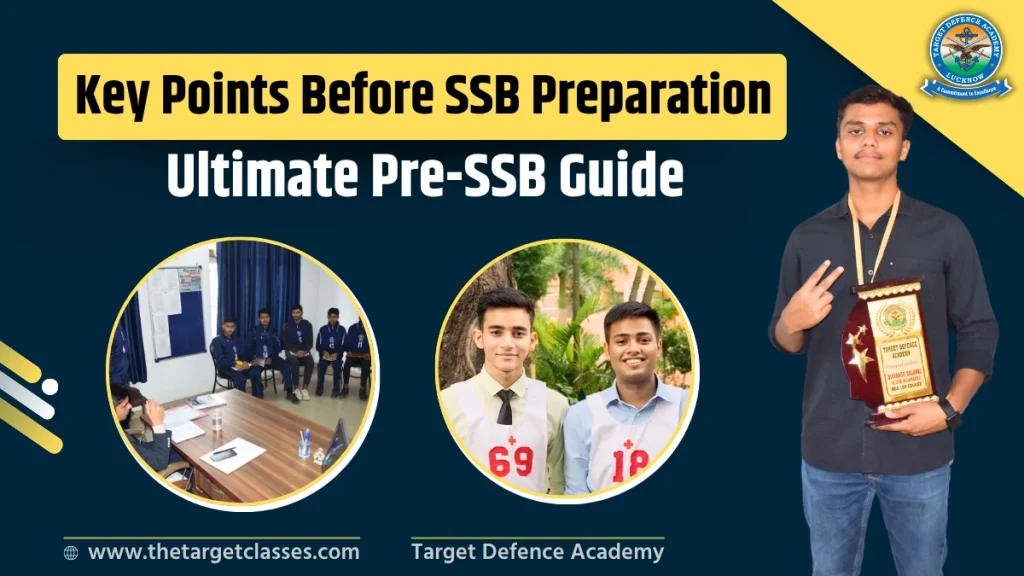1. Understand the SSB Journey
Before diving into prep, understand the full SSB structure:
- Day 0 – Arrival & Screening
- Day 1 – Psychology Tests
- Day 2 – GTO Tasks
- Day 3 – Personal Interview & Conference
Each step considers different officers, like OLQs. Knowledge lets you focus on preparations where it matters most.
2. Build a Strong Foundation in OLQs
OLQs like leadership, teamwork, integrity, and adaptability are central. Before any academic preparation:
- Self-reflect on past experiences, for example.
- Develop emotional intelligence through team sports and group activities.
- Practice disciplined habits such as flossing and ironing from time to time.
3. Create a Structured Study Plan
Go beyond studying—plan your prep like an officer:
- Daily traces for theory, group discussion, mock interview, and psychological drill.
- Balance of classes: 40% GTO, 30% PI, 30% psychology.
- Monthly posts to analyze progress and adjust strategy.

4. Gather Reliable Resources
Before starting intense prep, arrange quality materials:
- Trusted guides like “Uttam’s SSB Manual” and “Winning SSB.”
- Recordings of previous GTO tasks and PI walkthroughs.
- Peer or mentor groups for regular mock drills.
5. Strengthen Physical and Mental Stamina
SSB demands stamina and composure:
- Physical routine: daily push-ups, running, yoga for flexibility.
- Mind training: meditation, stress drills, timed reasoning tests.
- Group exposure: engage socially to develop empathy and confidence.
6. Practice Mock Sessions Early
You can’t start too soon:
- Weekly practice: 1 Psychological Test, 1 Group Work Simulation, and a Short Interview.
- Record yourself during a mock interview to assess tone, attitude, and clarity.
- Get real-time reaction from colleagues and masters.
7. Develop Time Management Skills
SSB tasks often have tight deadlines:
- Practice time-bound writing for TAT and WAT.
- Build task-switching capabilities—move quickly from one test to another with clarity.
- Know Organizing: Know which obligations call for more attention on a given day.
8. Cultivate a Leadership Mentality
An officer leads by example:
- Take responsibility in group discussions and prep groups.
- Embrace decision-making roles, even in everyday scenarios.
- Handle setbacks with calm and accountability.
- Tips to Crack SSB Interview in First Attempt
- 50 SSB SRT Questions with Answers: Best Preparation Guide for SSB Interview
- 10 PPDT Pictures with Stories for SSB | TAT Pictures for SSB
- SSB WAT: 50 Word Association Test for SSB with Answers
- List of Top 5 NDA Coaching in India | Best NDA Coaching in India
9. Enhance Communication Abilities
Verbal and non-verbal speaking matter:
- Join a speaking club like Toastmasters or a local debate forum.
- Practice structured speech: Open–Body–Close format with clarity and conciseness.
- Improve your language with daily reading and vocabulary.
10. Monitor and Reflect Progress
Track weekly goals and adjust:
| Weekly Task | Completed | Feedback |
| GTO Mock | ✔✔ | Need more assertiveness |
| TAT/WAT | ✔ | Improve pace |
Weekly self-review fosters constant improvement and alignment.
🎯 Pre-Start Checklist
✅ Know SSB stages and OLQs
✅ Gather reliable resources
✅ Form balanced prep schedule
✅ Begin physical and mental fitness
✅ Launch weekly mock sessions
✅ Continuously monitor and adapt prep
Final Thoughts
SSB without basic work is like starting a race without stretching, without jumping into Statistics Norway. By following these last preparation stages- thinking, resources, physical emergency preparedness, communication, and structuring false practice-you will enter the Statistics Norway Center as a self-confident, well-rounded candidate. Start today, make smart, and dominate your SSB tour with punishment!
FAQs for Key Points Before SSB Preparation
Ans. Start as a minimum of 3–6 months earlier than your anticipated SSB date to build confidence, communication capabilities, and OLQs.
Ans. OLQs are character developments like leadership, decision-making, bravery, and social adaptability—vital for SSB choice.
Ans. Not mandatory, but guided mentoring can help you understand the process, structure, and expectations better.
Ans. No. While primary health is vital, equal focus ought to be on intellectual sharpness, communication, and character development.
Ans. Very important. You have to understand your strengths, weaknesses, pursuits, and life dreams to reply to questions authentically.
Ans. Daily reading (newspapers/books)
Regular group discussions
Writing practice (for psych tests)
Maintaining a routine with physical activity
Ans. Yes, especially for PPDT, WAT, SRT, and GTO tasks. Mock sessions help improve time management and composure.
Ans. Keep your Call letter, unique ID proofs, mark sheets, certificates, and passport-sized snapshots geared up and prepared.

